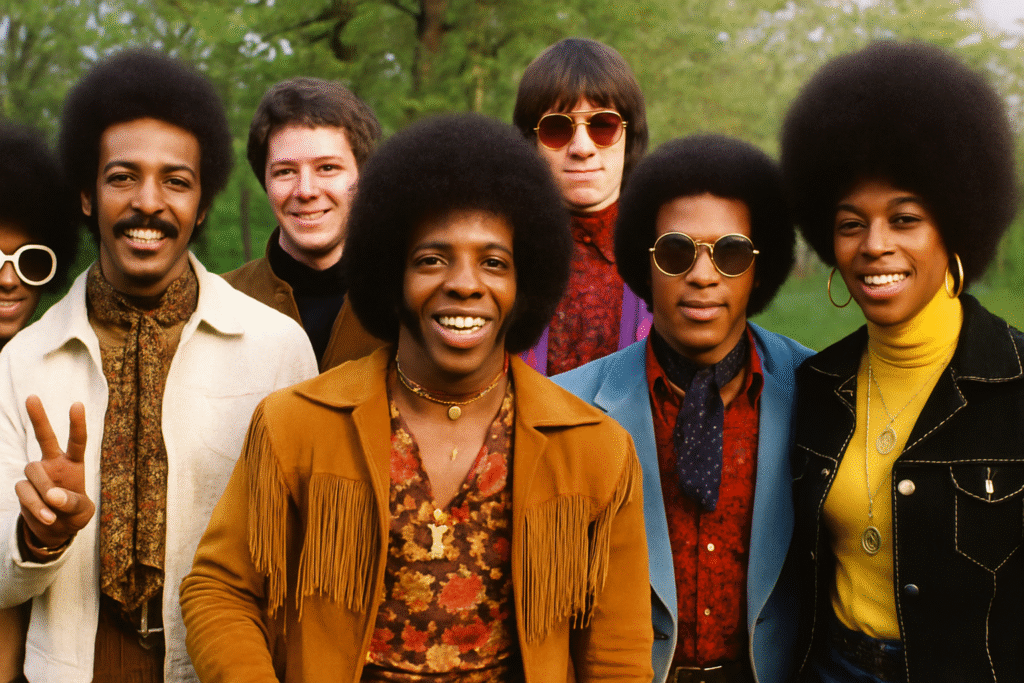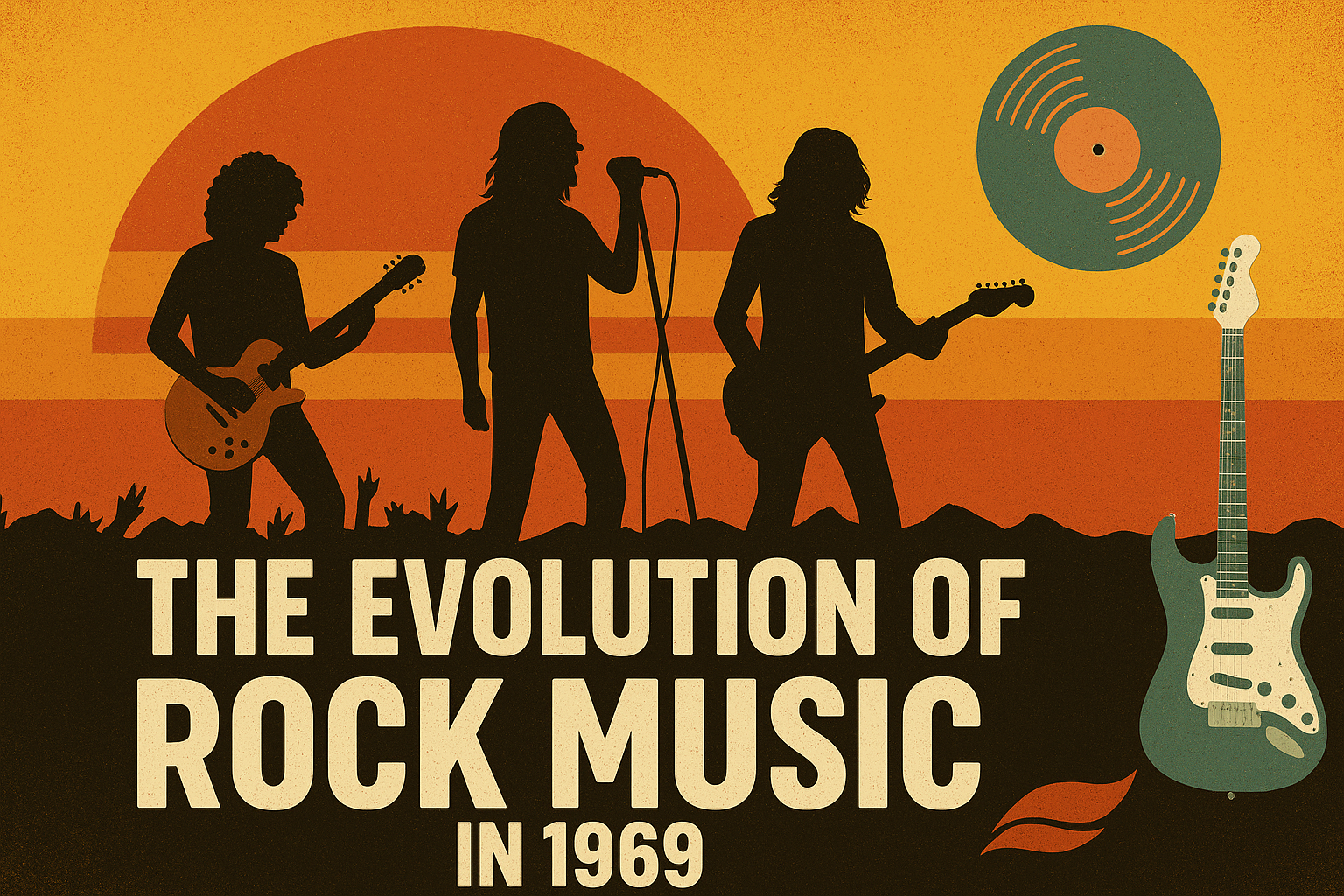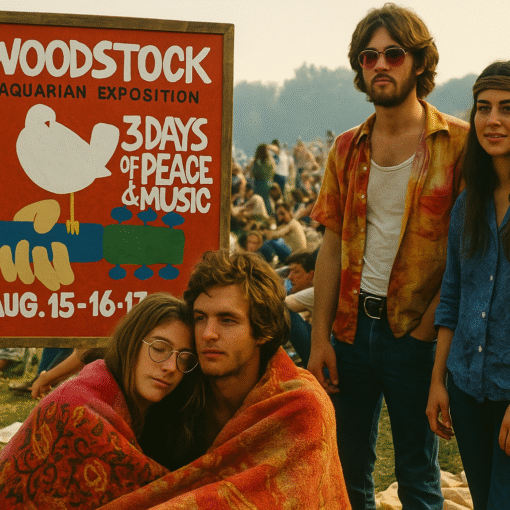The year 1969 was like a lightning bolt in the world of music. Imagine a time buzzing with innovative soundscapes and groundbreaking records that flipped the music scene on its head. It’s where the old guard met the new, a vibrant intersection that still resonates today.
From the counterculture movements to the fiery demands for civil rights, 1969 jam-packed all these elements into its musical output. Artists used their albums not just as a form of expression but as powerful statements against the status quo. This period wasn’t just about songs; it was about amplifying voices that called for change, weaving together music and social issues like never before.
During this year, albums became more than collections of songs—they were experiences. Rock, soul, blues, and psychedelia all collided, crafting a sound reflective of an era in upheaval and yet hopeful. Music became not just a backdrop but the forward thrust of a revolution, capturing the spirit and, quite literally, the sound of change.
But why focus on albums from this revolutionary year? Simply put, the records released transformed music, society, and culture. They pushed boundaries and smashed conventions, setting a precedent for future generations. So, when you’re sifting through the musical treasures of 1969, you’re not just listening—you’re stepping into a time machine that captures the essence of a transformative period.
The Album That Defined Peace: ‘Abbey Road’ by The Beatles

In 1969, The Beatles released what would be one of their most defining albums, ‘Abbey Road’. This record was the last one recorded by the band, making it a kind of swan song for a group that had already changed the face of music several times over.
‘Abbey Road’ features a little something for everyone—from the uplifting grooves of ‘Here Comes the Sun’ to the eclectic medley on side two that speaks to the album’s seamless storytelling. It showcases The Beatles at the peak of their musical prowess with innovative studio techniques and a refined sound that still captures the imagination.
One can’t discuss ‘Abbey Road’ without considering its iconic album cover—four men walking across a zebra crossing that has become one of the most famous images in popular culture. This singular photo has sparked endless discussions and tributes, cementing its place in history.
More than just a collection of tracks, ‘Abbey Road’ dives into themes of peace, introspection, and cohesion—a reflective backdrop to the chaos of the time. It was a reminder that music could be a place of refuge and unity amidst division and unrest. The Beatles managed to create an album that encapsulated the zeitgeist, offering solace and inspiration to its listeners.
Long after ‘Abbey Road’ first hit the airwaves, its impact is still felt, influencing countless artists and bands. For music enthusiasts today, it remains a timeless work of art that continues to invite new fans to explore its rich tapestry of sounds and stories.
Rock Legends Unite: ‘Led Zeppelin II’
In the late 60s, rock music was going through its own evolution, and Led Zeppelin was right at the heart of it. Their sophomore effort, ‘Led Zeppelin II’, dropped like a bombshell in 1969, shaking up the scene with its raw energy and electrifying riffs. This album didn’t just follow the rules; it rewrote them.
With tracks like ‘Whole Lotta Love’ blasting from speakers, listeners were treated to a visceral rock experience. The album is packed with powerful guitar solos and thunderous drum beats that make you feel like you’re right there at a live gig. It’s an album that speaks directly to the spirit, creating a connection with its listeners through sheer musical force.
Led Zeppelin II was all about pushing boundaries, blending blues with hard rock in a way that was fresh and bold. From Page’s guitar wizardry to Plant’s electrifying vocals, the album is a masterclass in rock excellence. It charts new territories while staying true to the rhythmic heart of blues, spinning excitement with every note.

For those discovering Zeppelin today, this album serves as a gateway into the seismic shifts in rock that were happening at the time. It’s not just a collection of songs; it’s an embodiment of the raw, untamed energy that defined an era. It invites listeners to feel the pulse of rock’s golden age—a timeless entry into a world of amplified emotion.
As you crank up the volume and let the music engulf you, ‘Led Zeppelin II’ is more than just an album. It’s an experience that captures the essence of rebellion and innovation that’s woven into the fabric of rock history.
Soulful Resonance: ‘Stand!’ by Sly and the Family Stone
Sly and the Family Stone dropped ‘Stand!’ in 1969, an album that went beyond just sound; it was a beacon of hope and change. This record isn’t merely music, but a galvanizing call to action, embodying the spirit of unity and empowerment in a world teetering on the brink of change.
The genius of ‘Stand!’ lies in its genre-bending nature. Funk, soul, rock and roll—Sly blended them all into a dynamic sound that got heads nodding and feet moving. Its catchy grooves and Sly’s funky vibes have left listeners spellbound for decades, making it a staple classic for anyone exploring the rich landscape of music from that era.
Tracks like ‘Everyday People’ and ‘I Want to Take You Higher’ speak volumes, tackling themes of equality, love, and bringing the world together. During a time charged with societal shifts and racial tensions, Sly’s message resonated with audiences longing for harmony and progress. It was as if the album held up a mirror, reflecting the aspirations and struggles of the time.

The power of ‘Stand!’ hasn’t waned—it’s still celebrated for its uplifting messages and irresistible sounds. The album’s ability to inspire dance floors and thoughtful reflection alike speaks to its enduring magic. For music lovers diving into 1969, ‘Stand!’ is essential listening, offering both infectious rhythm and profound lyrical depth.
Whether you’re a soul aficionado or new to the genre, diving into ‘Stand!’ provides a rich, rewarding experience. It’s an open invitation to feel, think, and groove like never before, and its influence continues to ripple through the music world today.
Psychedelic Sounds of Success: ‘In the Court of the Crimson King’ by King Crimson
King Crimson’s debut album, ‘In the Court of the Crimson King’, burst onto the scene in 1969, waving the flag for the burgeoning progressive rock movement. This album was a bold statement, an expansive world of music that dared to challenge the conventions and chart a course into the unknown.
Unlike anything before, the album layered complex structures, haunting vocals, and Mellotron-infused symphonies that could stir the imagination like few others could. Tracks like ’21st Century Schizoid Man’ and ‘Epitaph’ were more than just songs; they were a textured experience – a soundtrack to a vision both cerebral and emotional.
What makes this record special is its blend of chaos and beauty, all meticulously crafted to create a unique soundscape. King Crimson left their indelible mark on the listener from the first note to the last, pioneering a genre that would influence countless artists. They showed that rock could be both intellectual and soul-stirring, exploring deeper themes while pushing musical boundaries.

In a world where traditional structures dominated, King Crimson stepped in with their innovative spirit, creating an album that was as much about atmosphere as it was about sound. For those exploring the roots of progressive rock, this record offers a dynamic perspective on the genre’s early years.
Listening to ‘In the Court of the Crimson King’ is like stepping into a kaleidoscope, where every listen offers something new. Its legacy continues, inviting new listeners to experience the groundbreaking craftsmanship that still inspires and influences musicians across genres.
🎙️ Which 1969 album still rocks your world?
We’d love to hear your favorites—and why they matter to you. Drop a comment below and let’s talk music, memories, and the records that still move us more than 50 years later. ✌️💿



4 thoughts on “Top 10 Albums Released In 1969”
Hey Tommy,
You know how we were talking about influential music? I was just reading this fascinating piece about 1969 and how it was like a total lightning bolt for music! Apparently, it was this crazy time where artists were really pushing boundaries and using their albums to say something important.
It talked about how albums weren’t just collections of songs back then; they were like full-on experiences that mixed rock, soul, blues, and psychedelia. They even mentioned The Beatles’ ‘Abbey Road’ and King Crimson’s ‘In the Court of the Crimson King’ as examples of records that totally changed the game.
Honestly, reading about how King Crimson’s debut album was this wild mix of complex music and deep emotions has me wanting to listen to it right now! It sounds like 1969 was an absolutely incredible year for music, and these albums must be true treasures.
Talk soon,
Eric
Hey Eric,
Thanks so much for sharing your thoughts—and I love how you captured the spirit of 1969! You’re absolutely right—albums from that year weren’t just collections of tracks, they were full-blown artistic statements. The music really became a vehicle for social commentary, experimentation, and emotional depth all at once.
Abbey Road and In the Court of the Crimson King are perfect examples. The Beatles were mastering the art of the studio album, while King Crimson was practically inventing a new genre. It’s amazing how those two records—so different in sound—both helped redefine what an album could be.
You should definitely give In the Court a fresh listen—it hits differently when you approach it knowing the impact it had. Let me know what you think once you do!
Appreciate you dropping by and joining the conversation. Always great to connect with fellow music lovers!
-That was an interesting read, 😉
-I think that it is interesting how the innovations to music sounds coupled with changing stigmas and such during the late 1960’s produced such a big effect back then; the Abbey Road picture is also still an icon of a photo to this day in terms of popular culture and such.
-I also find it interesting how listening to “In The Court Of The Crimson King” can possibly sound differently each time it’s played; this reminds me of playing other similar 10+ minute tracks on repeat during my younger years to pass the time.
-Overall, I’m not surprised to see these four albums as Top-10 material; Led Zeppelin is famous for what he’s famous for and it seems like Sly And The Family Stone also has (or had) their work cut out for them [I have yet to give it a listen on my own time.]
-Great article; looking forward to more from you.
ALEJANDRO G.
Hey Alejandro, thanks so much for your comment—and I’m really glad you enjoyed the read!
You nailed it: the late ’60s were a turning point not just musically, but culturally. The innovation in sound and the breaking of social norms came together in such a powerful way. Abbey Road really is the perfect symbol of that moment—timeless both visually and sonically.
I totally agree with you about In the Court of the Crimson King—that album is a trip every time you hear it. It’s one of those rare records where you notice something new with each listen, and it’s awesome that it brought back memories of those long 10+ minute tracks from your own past. That’s the magic of progressive rock!
And yes, Sly and the Family Stone is definitely worth carving out time for—their fusion of funk, soul, and social commentary really helped shape the sound of the ’70s.
Appreciate your thoughtful take—more retrospectives like this are definitely coming!